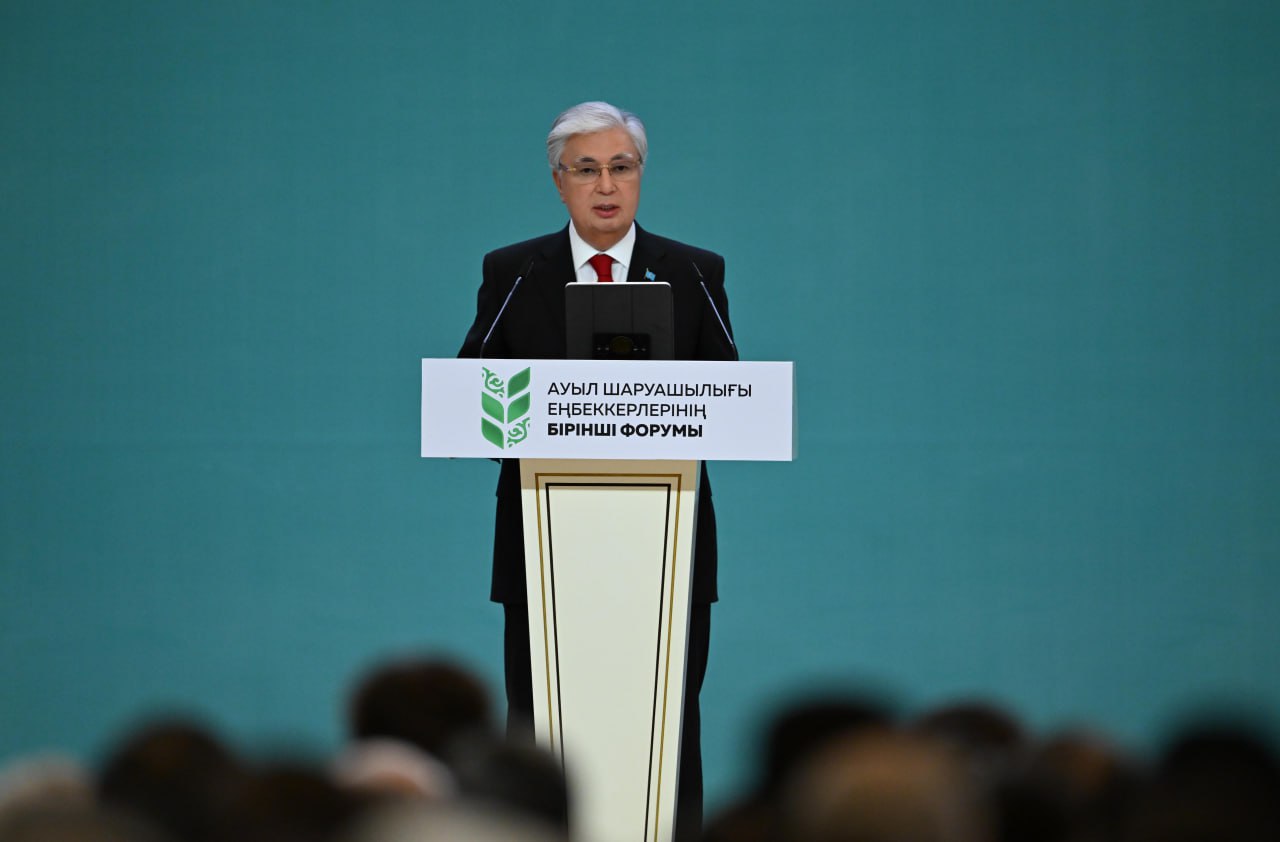ASTANA – President Kassym-Jomart Tokayev outlined key priorities to advance Kazakhstan’s agro-industrial complex at the first Forum of Agricultural Workers on Nov. 15, reported Akorda.

President Tokayev at the first Forum of Agricultural Workers. Photo credit: Akorda
Despite the challenging year, Kazakhstan harvested 26.7 million tons of grain, a record figure in the past ten years. The country ranks sixth globally in terms of arable land and pastures, and remains a top wheat and flour exporter. Inflation fell to 8.5% in October, and the national economy grew over 4% in ten months.
The agro-industrial complex should become one of the main driving forces of economic growth, Tokayev said, first and foremost, to ensure food security.
Increasing financing
Firstly, the President highlighted chronic underfunding as a major challenge, but this year, state spending on agriculture has risen significantly. For the first time, preferential loans for farmers exceeded threefold to 580 billion tenge (US$1.1 billion), and this funding will expand to 1.5 trillion tenge (US$3 billion) in the coming years.
Tokayev instructed the government to start offering spring fieldwork loans in December, enabling farmers to purchase fuel and spare parts, and other necessary goods and services in advance. He also directed the government to ensure transparent subsidy distribution and eliminate fraudulent reporting practices in the sector.
Industrializing agriculture proactively
Mentioning his instruction to increase the share of processed products in the agro-industrial complex to 70% within three years, Tokayev announced upcoming plans to build 116 modern dairy farms to boost milk production by 600,000 tons.
Other projects include 29 poultry farms producing 220,000 tons of meat annually, and 11 egg farms with a capacity of 850 million eggs per year. Six fattening sites for nearly 100,000 cattle and a complex for 50,000 small livestock will be established as well.
Advancing agricultural science
Recalling a comprehensive plan for the development of selection and seed production adopted this year, Tokayev set a goal to increase the share of domestically produced seeds to 80% by 2028 and ensure 15% are elite seeds.
He also instructed the government to create a Horse Breeding Institute to focus on the selection and breeding of purebred horses, which currently make up only 1%, or 40,000, of Kazakhstan’s 4.2 million horses.
Expanding technology use
The President pointed out a pressing problem of the insufficient use of mineral fertilizers in agriculture. To address this, Kazakhstan is implementing projects valued at $4 billion worth of investment to produce seven million tons of mineral fertilizers, thus meeting domestic demand and entering the export market.
Tokayev also encouraged developing organic fertilizer production, noting the potential of sheep wool as a natural alternative. He stressed the importance of digitizing agriculture to improve competitiveness, reduce the shadow economy, and improve public administration in the industry.
Modernizing agricultural machinery
The President recalled the task he set to increase the level of agricultural machinery renewal to 8-10% per year. He urged the government to focus on increasing labor productivity, supporting small-unit assembly, localizing imported components, and creating jobs.
Enhancing export potential
According to Tokayev, to boost export capacity, Kazakhstan has adopted a comprehensive plan to build and modernize storage facilities, adding 700,000 tons of capacity. Grain exports have resumed to markets of Uzbekistan, Azerbaijan, Turkmenistan, the Kyrgyz Republic, and Afghanistan.
Access to the Iranian market has also been restored, where 250,000 tons of barley have been shipped. Grain will be delivered to China, the European Union countries, and North Africa as well.
A new grain terminal in the port of Kuryk aims to enhance sea transportation, the President noted, and the role of international corridors such as the North-South and the Trans-Caspian route will increase, given the growing food needs of new markets. This year, Kazakhstan’s grain export potential stands at 12 million tons.
